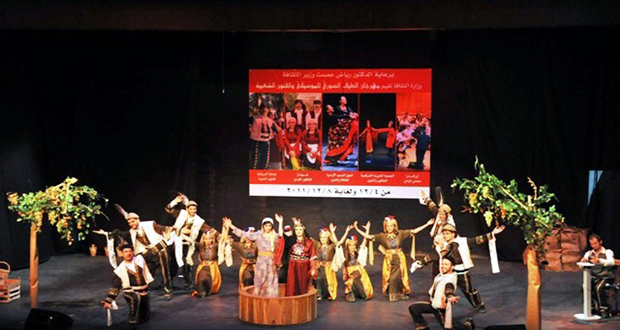Hasaka, SANA – While the cultural diversity in the northeastern region of Syria has provided a fountain for bands and groups getting formed and vying with each other to commemorate the cultural and artistic heritage of the region, Barmaya troupe stands out for its adoption of the Syrian Syriac arts.
The troupe’s director Ramtha Shamoun spoke to SANA about the inception of the troupe, which she said was first founded by artist George Qeryaqes in Qamishli city in the province of Hasaka.
Prompted by the aim to maintain the identity of the Syriac art and culture and present it to the whole world, the troupe was endorsed by the General Commission for Radio and Television in 2004.

Shamoun noted that the Syriac art is “the successor of the Sumerian, Phoenician, Akkadian, Chaldean, Babylonian and Assyrian arts which date back to more than 5000 years.”
She explained that the troupe works on enlivening the Syriac cultural and artistic heritage through presenting folkloric tableaus and shows inspired by the beauty of Syria’s nature, its conventional social and religious rituals and historical mythology with a modern tinge but with keeping the spirit of the heritage.
The dancers always perform wearing the traditional Syriac attire and dance to Syriac imbued music, Shamoun added.
It seems that everything about the troupe-not just its major interest and orientation-speaks of the Syriac culture. Also Its name derives from the words ‘Bar’ and ‘Maya’ in Syriac, a dialect of the Aramaic language, meaning ‘son’ and ‘water’, respectively. When combined Barmaya means “Sons of Water”, as Shamound explained.
The troupe, she said, comprises 100 members of different ages, ranging from 7 to 13 in the children’s band, 13 to 18 in the juniors and trainees’ band and from 18 and above in the professionals’ band, who count 40 and take part in activities outside the country.
Barmaya troupe has many local titles to its name and has made its mark through various remarkable participations in international festivals, including in ‘Doha…the Capital of Culture’ festival of 2010 and the Mediterranean Festival held in Cyprus.
H. Said
 Syrian Arab News Agency S A N A
Syrian Arab News Agency S A N A




